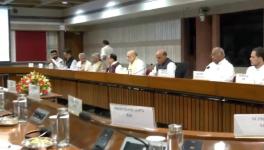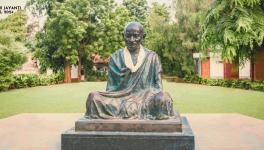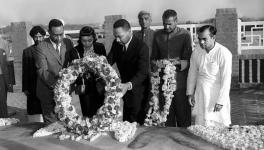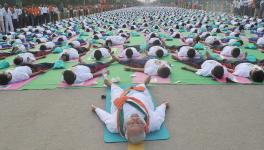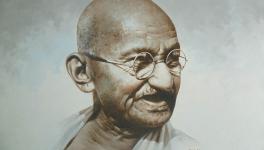Did Gandhi tell Savarkar to File Mercy Petitions?
It is taking plenty of propaganda to promote Hindu nationalists as icons of the Indian freedom movement. On 2 October, right-wing Twitterati created a massive Twitter storm for Nathuram Godse, the man who murdered Gandhi. Now it is Nathuram’s guru, Vinayak Damodar Savarkar’s turn. When he was young, Savarkar encouraged using arms against British officers. However, Vinayak 2.0 was born once the British sent him to Andaman. Imprisonment here was known as Kala Pani, reflecting the extraordinarily adverse conditions of its inmates. Now, Savarkar developed the Hindutva ideology and his notions of an ethnic, exclusivist Hindu nation. It was also from here that he sent at least six mercy petitions asking the British for release. He started writing these petitions in 1911 and continued until he got released.
So far, the followers of Savarkar had denied he wrote mercy petitions. Many hagiographic biographies have spruced up his image as a revolutionary and Hindutva ideologue, but still, the letters he wrote to the British are in circulation in public. However, last week, the entire episode took an ironic turn when Defence Minister Rajnath Singh accepted Savarkar wrote petitions to the British but blamed Gandhi—not the letter-writer—for them.
The BJP leader’s Goebbelsian skills came to the fore at the release of yet another Savarkar biography. (This one is by Uday Mahurkar and Chirayu Pandit, and it is titled “Veer Savarkar: The Man who could have prevented Partition”.) Singh said at the event that “lies were spread about Savarkar…Time and again, it was said he filed mercy petitions before the British government. But the truth is that he did not file mercy petitions for his release. A prisoner has the right to file mercy petitions. It was Mahatma Gandhi who asked him to file mercy petitions. He filed a mercy petition after Gandhi’s advice. Mahatma Gandhi had appealed that Savarkar-ji should be released. He also warned that the act of demeaning his national contribution will not be tolerated”.
Now, how to reconcile a revolutionary with the one who repeatedly apologised to the British? And, what is the truth? Savarkar was arrested on 13 March 1910. The charge was that he had supplied a pistol to kill a Nashik district collector named AMT Jackson. And, sure, prisoners are free to write mercy petitions if they want. Mainly, prisoners seek clemency on the grounds of health or family-related concerns. So the suggestion by Singh that Savarkar petitioned the British on a fixed format is untrue. For, all the petitions Savarkar wrote are different, and they pleaded for mercy on the ground that he was a misguided youth when he committed the acts that got him imprisoned. Savarkar also accepted his punishment was just but said he should be released anyway as he has realised his errors. To top it all, he expressed readiness to serve the British government in whatever capacity they wished.
Now, this is more than abject, even for apologies. The tone and tenor of most of the letters Savarkar wrote are on these lines, exemplifying how far one can bend on ones’ knee to secure release from prison. Many authors have quoted these letters extensively, so it is not news either.
Now consider the claim that Gandhi insisted Savarkar sends these petitions. When Savarkar began writing his mercy petitions, Gandhi was in South Africa and returned to India in 1915. He was gradually assuming the leadership of the Congress party when he received a letter in January 1920 from Savarkar's’ brother, Dr Narayan Savarkar, seeking help to secure his brother’s release.
Gandhi responded on 25 January 1920, and the very first sentence does not give Narayan much reason for hope, “It is difficult to advise you...,” the letter begins. Gandhi advises Narayan to “frame a petition setting forth the facts of the case bringing out in clear relief the fact that the offence committed by your brother was purely political.” He also wrote he is “moving the matter in his own way”. This reply is in volume 19 of the Collected Works of Mahatma Gandhi. Gandhi gives the reason for his suggestion. It is so that “...it would be possible to concentrate public attention on the case.” In other words, Gandhi does not say Savarkar himself should write a petition from prison and certainly does not mention writing to the British.
In a different context, the incarceration of Durgadas Adwani, Gandhi wrote: “...the handful of satyagrahis must be prepared to treat the prison as their second home.” He also wrote, “I hope therefore that the friends of Durgadas will not advise him or his wife to petition for mercy nor add to the wife’s unhappiness by commiserating with her. On the contrary, it is our duty to ask her to steel her heart and feel glad that her husband is in jail for no fault of his own. The truest service that we can render to Durgadas would be to offer Mrs. Durgadas such assistance, pecuniary or otherwise, as she may need...”
Gandhi also wrote an article (available in volume 20 of his collected works, pp 369-371), saying Savarkar should be released and allowed non-violent political participation. However, he also appealed on similar lines for Bhagat Singh later. His inclusive view of the national movement had him undertake such endeavours. Now, the Hindutva brigade is concocting the falsehood that Gandhi advised Savarkar to write his craven apologies. The irony of history is that Gandhi wrote in support of the release of Savarkar, who later was accused of Gandhi’s murder. Sardar Patel wrote to Jawaharlal Nehru that a fanatical wing of the Hindu Mahasabha directly under Savarkar hatched the conspiracy [to kill Gandhi]...” Later, the Jeevanlal Kapoor Commission came to a similar conclusion.
Savarkar later tried to work for the temple entry of Dalits, did not consider the cow a sacred animal, but the central focus of his life remained to help the British in every way. He deepened the foundations of Hindu nationalism in contrast to Indian nationalism, which struggled for the country’s independence. In 1942, when Gandhi called for Quit India, Savarkar instructed Hindu Mahasabhaites to continue discharging their duties for the British. He helped the British get recruits for their army as well.
Hindu nationalists want to glorify Savarkar, but interestingly, they have to take cover under Gandhi’s image, in whose murder the emerging Hindutva icons were implicated. Rajnath Singh’s statement exemplifies how the right-wing blatantly deploy untruths to serve its political goals.
The author is a social activist and commentator. The views are personal.
Get the latest reports & analysis with people's perspective on Protests, movements & deep analytical videos, discussions of the current affairs in your Telegram app. Subscribe to NewsClick's Telegram channel & get Real-Time updates on stories, as they get published on our website.











